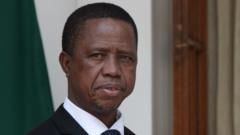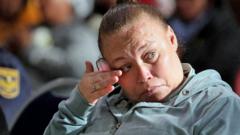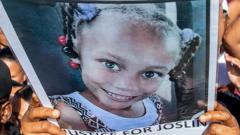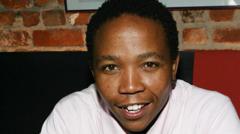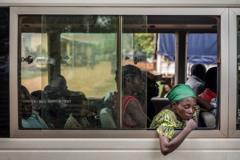South Africa's coalition government is on precarious ground as the African National Congress (ANC) and the Democratic Alliance (DA) clash over a national budget vote. The DA has filed a legal challenge against the fiscal framework, while internal tensions escalate about the coalition's future.
Tensions Rise as South Africa's Coalition Government Faces Budget Crisis

Tensions Rise as South Africa's Coalition Government Faces Budget Crisis
The fragile coalition between the ANC and DA is threatened as sharp ideological divides become apparent following a crucial budget vote.
South Africa's coalition government, forged less than a year ago, is facing intense scrutiny as significant divisions between its largest parties, the African National Congress (ANC) and the Democratic Alliance (DA), have come to the forefront during a critical budget decision.
In a key vote, the DA opposed the fiscal framework, a major component of the national budget, on grounds that it would enforce an undesirable increase in VAT while failing to cut excessive government spending. Conversely, the ANC, presenting itself as a centre-left entity, dismissed the DA's austerity appeals and successfully rallied support from various smaller parties to push the fiscal framework through parliament with a vote of 194 to 182.
The DA's response was swift; they filed a court challenge, labeling the voting process "procedurally flawed" and signaling an uncertain future for their role in what is referred to as a government of national unity (GNU). Political analyst Professor William Gumede noted that the DA is at a crossroads, weighing whether to stay or exit the coalition while awaiting the court's ruling.
The coalition was established after the ANC lost its long-held parliamentary majority in the last elections, marking a historic shift since Nelson Mandela’s leadership brought the party to power following apartheid. Business sectors in the country favored the coalition, viewing it as essential for ensuring economic stability. However, the latest budget debate illuminated the cracks in this political alliance, with DA spokesperson Willie Aucamp criticizing the ANC for a "serious infraction" and a failure to share power equitably.
Echoing similar sentiments, DA federal leader Helen Zille indicated that while coalitions necessitate compromises, the ANC's intransigence might provoke a reconsideration of their participation in the GNU. The ANC's parliamentary chief whip, Mdumiseni Ntuli, accused the DA of betraying their coalition partners, asserting that other coalition parties remain committed to governance despite the frictions with the DA.
Moreover, the DA found itself allied with opposition parties like the Economic Freedom Fighters (EFF) and the Inkatha Freedom Party (IFP)—historically opposed forces—to stand against the VAT hike, unified in their belief that such a tax increase would adversely affect the less fortunate. DA leader John Steenhuisen claimed that the ANC is disconnected from the everyday struggles of South African citizens.
In response, the ANC argued that the VAT hike, which includes a 0.5% increase this year and another next year, is necessary for funding vital public services, including healthcare and education. The alignment of the IFP with the ANC in the budget vote raises questions about the future dynamics of the coalition, as it signals shifting allegiances in South African politics.
Although the coalition remains intact for now, the fallout from the budget dispute exemplifies the deep-rooted ideological disparities between the ANC and DA, with ongoing legal battles and unresolved policy disagreements—including challenges over land expropriation legislation—adding further strain to their partnership. Observers, including Gumede, note that the ANC's call for higher taxes amidst declining public services poses a substantial challenge to the party's credibility.
As South Africa grapples with rising economic pressures, including a precarious unemployment rate exceeding 30%, the need for collaboration between the ANC and DA grows ever more urgent. The situation serves as a clarion call for both parties to either reconcile their differences or risk plunging the nation further into economic turmoil, especially in light of increasing international trade tensions, like the recent sanctions imposed by the United States.


